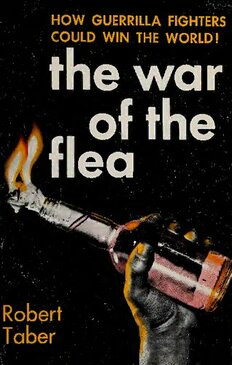
The War of the Flea: A Study of Guerilla Warfare Theory and Practice PDF
Preview The War of the Flea: A Study of Guerilla Warfare Theory and Practice
Digitized by the Internet Archive in 2019 with funding from Kahle/Austin Foundation https ;//archive.org/details/waroffleastudyofOOOOtabe Robert Taber was born in Illinois and raised in Tennessee. He began work as a farmhand at fourteen and has been a merchant seaman, tugboat fireman, and railroad worker. As a reporter, Taber has covered revolutions in Central America, North Africa, and the Caribbean. He was the first journalist to conduct a television interview with Fidel Castro, in the Sierra Maestra early in 1957, when the fidelista forces numbered fewer than one hundred armed men. After Castro came to power Robert Taber worked at the United Nations as a correspondent for El Mundo, Habana, and then in Cuba for El Mundo and Revolucion. He fought with defending forces at the Bay of Pigs and was wounded at Playa Giron during the final hours of the battle, subsequently spending five months in hospital. Taber is also the author of M-26: Biography of a Revolution. Robert Taber War of the Flea A Study of Guerrilla Warfare Theory and Practice The Citadel Press, New York First paperbound edition, 1970 Published by Citadel Press, Inc. A subsidiary of Lyle Stuart, Inc. 222 Park Avenue South, New York 10003 @ Copyright by Robert Taber 1963,1969 Manufactured in the United States of America ISBN 0-8063-0223-8 In Memory Of An Old Fashioned American George A. Thurston 33 Contents Introduction 11 1 The wind of revolution. Popular will as the key to strategy. The confrontation of the haves and the have- nots. Fallacies of counter-insurgency. Guerrilla war as an extension of politics. Cracks in the armour of the modem state. 14 2 The war of the flea. Political and military objectives. Creating ‘the climate of collapse’. Organization of in¬ surgent forces. Guevara on guerrilla war: the base. 27 3 Inception and evolution of an insurgency. Transition to civil war. Alternative solutions. The Cuban example. 34 4 Protracted war. Popular forces versus regular armies. The guerrilla as missionary. Mao Tse-tung on the war of the flea. The lessons of China. 45 5 Colonial war and the French experience. Strategy and tactics of Vo Nguyen Giap. How the Vietminh won in Indo-China. 59 6 The political character of the Second Indo-China War. The American role. Expansion of the war. 73 7 Wars of national liberation and their cost. The Irish ‘troubles’ and the role of the Black and Tans. Terrorism in Israel. Rebellion in North Africa. 90 8 General Grivas on guerrilla war in Cyprus. The political uses of terrorism. Errors of British strategy. 106 9 Failures in the war of the flea. Magsaysay and the Huks in the Philippines. The price of British victory in Malaya. Why the communists lost in Greece. 120 10 Sun Tzu on The Art of War. Principles of guerrilla strategy and tactics. Terrain as a determining factor. Guerrilla war in urban areas. The character of the guerrilla. 131 11 Guerrilla movements in the Third World. The revolu¬ tionary base. Outlook for the United States. 150
